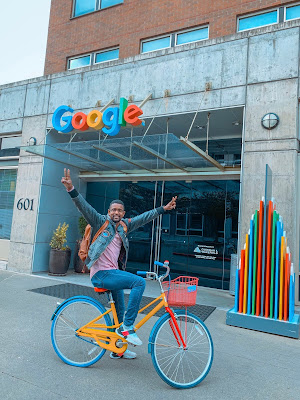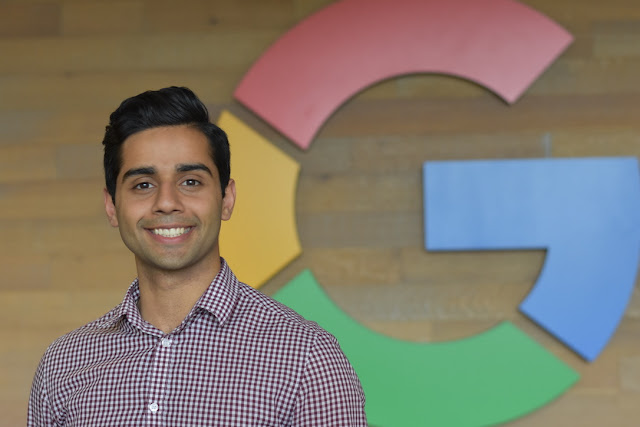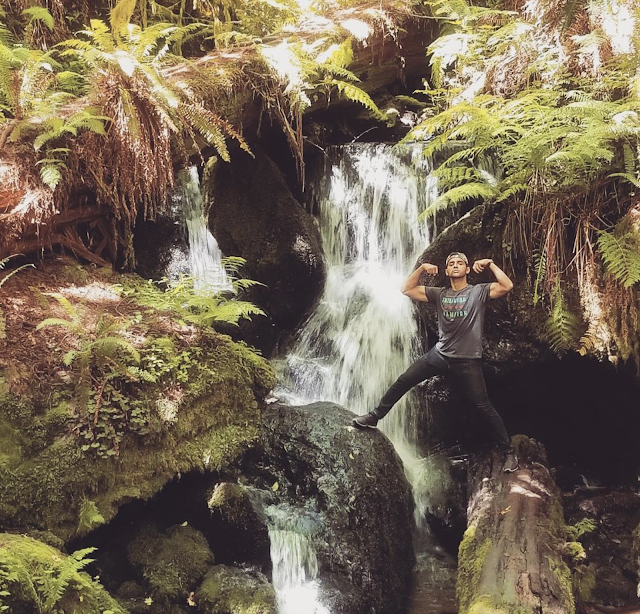Welcome to the 43rd installment of our blog series “My Path to Google.” These are real stories from Googlers, interns, and alumni highlighting how they got to Google, what their roles are like, and even some tips on how to prepare for interviews.
Today’s post is all about Juan Angustia. Read on!
Can you tell us a bit about yourself?
I was born and raised in Constanza, a small town surrounded by beautiful mountains in the Dominican Republic. In the year 2004, before I ever dreamed of joining Google, I went to college at the Universidad Autónoma de Santo Domingo (UASD) to study Advertising with a focus on Graphic Design. However, I did not finish my degree because the school did not offer classes that sparked my specific interests. Instead, I decided to continue teaching myself the things that I loved.
At that time, a career in UI or UX didn’t exist. You either studied Graphic Design or Advertising, which I was never passionate about. I wanted to work on something that people could interact or play with, something more exciting. This is why I started to design websites.
During and before I started college, Google was my main source of knowledge. I attribute 80% of the knowledge I obtained to the information I found on Google. Back in the day, I remember walking miles from home to the only computer lab in town. This was the only place where I was able to get internet access. Every day after lunch I took my central processing unit (CPU) and walked to the lab. I connected my CPU and my first thought was to open Google.com to search for tutorials on how to use Photoshop or how to create digital designs.
When I’m not working, I love to dance. It is a form of mediation for me, and also a way to express and share my Latino/Caribbean vibes with others. Sometimes at the office, I dance and work at the same time. I also love to travel and work on personal projects. I take photos and make videos like my short film El Camino. These hobbies to me are a way to find inspiration outside of my day to day work. If you want to know more, feel free to check out my Medium and Instagram: @jcagarcia.
What’s your role at Google?
I’m a Visual Designer on the Google Duo team in our Seattle/Kirkland office. I’m blessed to be part of this team. The culture, the people, and the vibes are the things that I like the most.. A cool project of mine was recently launched, the new Duo precall interface for the web, which you can check out. You can even submit feedback if you have ideas to help improve the experience for our users.
What inspires you to come in every day?
I’ve been working at Google for almost a year, and every day is like living a dream. I feel grateful for the opportunity that I have. Working with very talented people with diverse backgrounds (professional and cultural), and with products that touch billions of people's lives around the world is one of the most exciting things that I could mention. In other words, I work with an incredibly diverse group of people who are some of the smartest, most creative, and humble people I've ever met. I learn something new every time I’m in a meeting.
Can you tell us about your decision to enter the process?
The first time that I applied I was rejected for lack of qualifications. Four years later, I was contacted again. I still don’t know how to describe the feeling when I read the subject line in that email, “Hello from Google.” It was a mixture of excitement and fear. It was a difficult decision to make, because at that time I had a stable position at my former job in Philadelphia. I also had just bought an apartment a year prior that I absolutely loved.
Also, I didn’t know if I was ready for the job, or to move cross country and leave my mother behind in Philadelphia whom just three years prior I had brought to the U.S. to fulfill her “American Dream.”
How did the recruitment process go for you?
After the first initial call, I was able to move on to the second round of calls, which would be with a designer who would evaluate my experience.The interview process was very friendly and comfortable. Another detail that I noticed from the first moment, was the high attention to detail and how important the recruiter made me feel throughout the process.
The more nerve-racking but also exciting part was the design exercise, where I was to show my design skills and process. To make a long story short, it took me two weeks to plan, idealize, design, and prepare my project
Much to my relief, a week after I turned in my design I received a call from the recruiter who was working with me during the interview process. They told me that I had passed the exercise and that I would proceed with an in-person interview at the Google headquarters in Mountain View, California. A shoutout to the excellent attention I received from the recruiter who assisted me throughout this entire process.
The whole interview process took me about three months — months filled with mixed emotions. Finally, after spending months of waiting to complete the entire interview process and contemplating whether I should accept the opportunity to join Google, I decided to accept the position of Visual Designer in Seattle with the Google Duo team.
Can you tell us about the resources you used to prepare for your interview or role?
I read a lot about Google Material Design, reached out to friends who work at Google, and also watched videos on YouTube about how to prepare for a Google interviews.
Do you have any tips you’d like to share with aspiring Googlers?
I would recommend that they identify what it is that they are good at and focus on the things that they are passionate about. Never stop dreaming. Continue to pursue your dreams and channel your passion by doing the things you truly love. This is undoubtedly what will help you conquer any opportunity.
Today’s post is all about Juan Angustia. Read on!
Can you tell us a bit about yourself?
I was born and raised in Constanza, a small town surrounded by beautiful mountains in the Dominican Republic. In the year 2004, before I ever dreamed of joining Google, I went to college at the Universidad Autónoma de Santo Domingo (UASD) to study Advertising with a focus on Graphic Design. However, I did not finish my degree because the school did not offer classes that sparked my specific interests. Instead, I decided to continue teaching myself the things that I loved.
At that time, a career in UI or UX didn’t exist. You either studied Graphic Design or Advertising, which I was never passionate about. I wanted to work on something that people could interact or play with, something more exciting. This is why I started to design websites.
During and before I started college, Google was my main source of knowledge. I attribute 80% of the knowledge I obtained to the information I found on Google. Back in the day, I remember walking miles from home to the only computer lab in town. This was the only place where I was able to get internet access. Every day after lunch I took my central processing unit (CPU) and walked to the lab. I connected my CPU and my first thought was to open Google.com to search for tutorials on how to use Photoshop or how to create digital designs.
When I’m not working, I love to dance. It is a form of mediation for me, and also a way to express and share my Latino/Caribbean vibes with others. Sometimes at the office, I dance and work at the same time. I also love to travel and work on personal projects. I take photos and make videos like my short film El Camino. These hobbies to me are a way to find inspiration outside of my day to day work. If you want to know more, feel free to check out my Medium and Instagram: @jcagarcia.
 |
| As a Dominican I have music on my blood, it is part of our culture. Merengue and Bachata are some of our typical music. This is a tambora (drum), a popular Dominican instrument. |
What’s your role at Google?
I’m a Visual Designer on the Google Duo team in our Seattle/Kirkland office. I’m blessed to be part of this team. The culture, the people, and the vibes are the things that I like the most.. A cool project of mine was recently launched, the new Duo precall interface for the web, which you can check out. You can even submit feedback if you have ideas to help improve the experience for our users.
 |
| Duo team event in Playa Vista, Los Angeles. My design for the event is on the screen. |
What inspires you to come in every day?
I’ve been working at Google for almost a year, and every day is like living a dream. I feel grateful for the opportunity that I have. Working with very talented people with diverse backgrounds (professional and cultural), and with products that touch billions of people's lives around the world is one of the most exciting things that I could mention. In other words, I work with an incredibly diverse group of people who are some of the smartest, most creative, and humble people I've ever met. I learn something new every time I’m in a meeting.
 |
| The team at an offsite event. |
The first time that I applied I was rejected for lack of qualifications. Four years later, I was contacted again. I still don’t know how to describe the feeling when I read the subject line in that email, “Hello from Google.” It was a mixture of excitement and fear. It was a difficult decision to make, because at that time I had a stable position at my former job in Philadelphia. I also had just bought an apartment a year prior that I absolutely loved.
Also, I didn’t know if I was ready for the job, or to move cross country and leave my mother behind in Philadelphia whom just three years prior I had brought to the U.S. to fulfill her “American Dream.”
 |
| Checking out the Android statue garden. |
After the first initial call, I was able to move on to the second round of calls, which would be with a designer who would evaluate my experience.The interview process was very friendly and comfortable. Another detail that I noticed from the first moment, was the high attention to detail and how important the recruiter made me feel throughout the process.
The more nerve-racking but also exciting part was the design exercise, where I was to show my design skills and process. To make a long story short, it took me two weeks to plan, idealize, design, and prepare my project
Much to my relief, a week after I turned in my design I received a call from the recruiter who was working with me during the interview process. They told me that I had passed the exercise and that I would proceed with an in-person interview at the Google headquarters in Mountain View, California. A shoutout to the excellent attention I received from the recruiter who assisted me throughout this entire process.
The whole interview process took me about three months — months filled with mixed emotions. Finally, after spending months of waiting to complete the entire interview process and contemplating whether I should accept the opportunity to join Google, I decided to accept the position of Visual Designer in Seattle with the Google Duo team.
What do you wish you’d known when you started the process?
I would have liked to know more about Google’s internal environment and culture, something that I learned after joining the company and by reading “How Google Works” by Eric Schmidt & Jonathan Rosenberg. I highly recommend reading this book, this helped me immensely to understand Google’s culture, the company’s history and how people manage their projects and time. |
| At my Noogler orientation, showing how proud I am to have come from the small town of Constanza, Dominican Republic to Google. |
I read a lot about Google Material Design, reached out to friends who work at Google, and also watched videos on YouTube about how to prepare for a Google interviews.
Do you have any tips you’d like to share with aspiring Googlers?
I would recommend that they identify what it is that they are good at and focus on the things that they are passionate about. Never stop dreaming. Continue to pursue your dreams and channel your passion by doing the things you truly love. This is undoubtedly what will help you conquer any opportunity.
| Me with a little guitar that I made using a vinegar bottle, piece of wood and fishing lines. (1996). |














